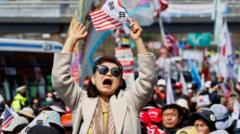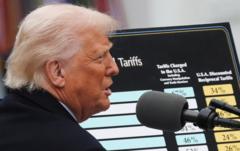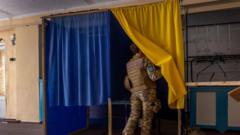Following Yoon Suk Yeol's impeachment, South Korea is grappling with a divided populace and the urgent need for a new leader. While supporters celebrate his removal, many fear the implications of his controversial tenure and the lingering specter of martial law.
South Korea Faces Uncertainty Following Presidential Impeachment

South Korea Faces Uncertainty Following Presidential Impeachment
The abrupt removal of President Yoon Suk Yeol has left South Korea in a state of political turmoil and deep divisions among its citizens.
South Korea has entered uncharted political waters following the Constitutional Court's unanimous decision to remove President Yoon Suk Yeol from office. Yoon's impeachment, stemming from his controversial attempt to impose martial law, is a pivotal moment for the nation, prompting a mix of celebrations and despair across Seoul as the ruling unfolded.
The court's verdict signifies a crucial moment for South Korean democracy. Most citizens welcomed the news that speaks to the resilience of democratic values, which felt threatened when Yoon attempted a military takeover in December. The court condemned Yoon’s actions, with Judge Moon Hyung-bae stating that the president's conduct was a violation of the people’s rights and the principles of rule of law.
However, the path ahead remains troubled as South Korea prepares for a snap election scheduled by June 3 to elect Yoon’s successor. The political climate is rife with distrust and division. Yoon’s legacy is marked not just by his brief tenure, but by the polarization it has instigated. Thousands have taken to the streets protesting against perceived corruption in the judiciary and government, with significant segments of the population echoing Yoon’s unsubstantiated claims of foreign infiltrations affecting national security.
Yoon's defiance throughout his impeachment has galvanized his supporters and fueled conspiracy theories that thrive in the current discontent. A considerable faction of the populace now questions the legitimacy of democratic institutions, with trust in the Constitutional Court and electoral process plummeting.
As the country looks towards selecting a new leader, the urgent need to unify as a democracy cannot be overstated. Navigating tense relations with foreign powers, particularly the looming threat of economic pressures from the US, adds further urgency to the leadership transition. Many wonder who will rise to the occasion and address the citizens’ fractured hopes amidst this turbulent backdrop.
Yoon, still defiant, has expressed remorse to his followers while continuing to reject the legitimacy of the impeachment decision. As the dust settles on this historical event, South Korea stands at a crossroads, facing the daunting task of healing and re-establishing confidence in its political fabric.



















